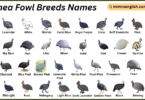Surgical instruments are special tools that doctors and surgeons use during operations. Each instrument has its own purpose and is designed to help make surgery safe, clean, and successful. Some are used for cutting, some for holding or pulling, and others for stitching or stopping bleeding. These tools must be strong, clean, and easy to handle. Learning the names of surgical instruments can be helpful for medical students, nurses, or anyone interested in healthcare. In this article, you will learn the names of common surgical instruments in English, along with pictures to help you recognize each one.
List of Surgical Instruments Names in English
- Scalpel
- Scissors
- Forceps
- Needle Holder
- Retractor
- Hemostat
- Suction Tube
- Surgical Blade
- Surgical Needle
- Surgical Stapler
- Surgical Sponge
- Bone Saw
- Curette
- Trocar
- Catheter
- Dilator
- Endoscope
- Electrosurgical Pencil
- Probe
- Speculum
General surgical instruments name with Pictures
- Scalpel
A scalpel is a small, sharp knife used to make cuts in the body during surgery.

- Scissors
Surgical scissors are used to cut tissues, sutures, or materials during an operation.

- Forceps
Forceps are tweezer-like tools used to hold, grasp, or move tissues safely.

- Needle Holder
A needle holder is used to hold needles firmly while stitching wounds during surgery.

- Retractor
A retractor is used to pull back tissues or skin to give better view to the surgeon.

- Hemostat
A hemostat clamps blood vessels to stop or control bleeding during surgery.

- Suction Tube
A suction tube removes blood, fluids, or air from the surgical area to keep it clear.

- Surgical Blade
A surgical blade is a sharp metal blade attached to a scalpel handle for cutting skin or tissues.

- Surgical Needle
A surgical needle is used to pass sutures through tissues for stitching wounds.

- Surgical Stapler
A surgical stapler is used to close wounds or cuts quickly by placing metal staples.

- Surgical Sponge
A surgical sponge absorbs blood and fluids during surgery and keeps the area clean.

- Bone Saw
A bone saw is a special saw used to cut through bones during surgeries.

- Curette —
A curette is a spoon-shaped tool used to scrape or clean tissues from a surface.

- Trocar
A trocar is a pointed instrument used to insert tubes or drains into the body.

- Catheter
A catheter is a thin tube inserted into the body to drain fluids or urine.

- Dilator
A dilator is used to slowly widen an opening or passage in the body.

- Endoscope
An endoscope is a thin tube with a camera used to look inside the body without large cuts.

- Electrosurgical Pencil
An electrosurgical pencil uses electric current to cut tissues or stop bleeding.

- Probe
A probe is a thin, smooth instrument used to explore wounds or body cavities.

- Speculum
A speculum is used to gently open a body opening for examination or surgery.

Commonly Used Surgical Instrument
- Tenaculum
- Rongeur
- Elevator
- Clamp
- Ligature
- Tourniquet
- Cannula
- Laparoscope
- Bone Chisel
- Gigli Saw
- Bovie Cautery
- Skin Hook
- Kerrison Rongeur
- Rib Spreader
- Surgical Mesh
- Babcock Forceps
- Allis Clamp
- Deaver Retractor
- Richardson Retractor
- Periosteal Elevator
Surgical instruments Pictures and names
- Tenaculum
Surgeons use a tenaculum, a sharp tool, to grasp and hold tissues during surgery.

- Rongeur
Surgeons use a rongeur, a strong instrument, to cut and remove small bone fragments.

- Elevator
Surgeons use an elevator to gently lift or separate tissues or bones during surgery.

- Clamp
Surgeons use a clamp to tightly grip blood vessels or tissues and control bleeding.

- Ligature
Surgeons use a ligature, a special thread, to tie and seal blood vessels during surgery.

- Tourniquet
Surgeons apply a tourniquet, a tight band, to restrict blood flow in a limb during surgery.

- Cannula
A cannula is a thin, hollow tube used to move fluids into or out of the body.

- Laparoscope
Surgeons insert a laparoscope, a thin tube with a camera, through small incisions to examine the abdomen.
- Bone Chisel
Orthopedic surgeons use a sharp bone chisel to cut or shape bones during procedures.

- Gigli Saw
Doctors guide a flexible Gigli saw to make smooth, precise bone cuts.

- Bovie Cautery
A Bovie cautery uses electric current to cut tissue and stop bleeding during surgery.

- Skin Hook
A skin hook is a small, pointed tool used to gently lift and hold the skin.

- Kerrison Rongeur
A Kerrison rongeur is used to remove tiny pieces of bone, mainly near the spine.

- Rib Spreader
A rib spreader is a tool that gently opens the ribs for chest surgeries.

- Surgical Mesh
Surgeons implant a net-like surgical mesh to reinforce weak tissues in the body.

- Babcock Forceps
Doctors use Babcock forceps to grasp soft tissues gently, preventing damage.
- Allis Clamp
Surgeons apply an Allis clamp to grip and maneuver heavier or tougher tissues during procedures.

- Deaver Retractor
A surgeon uses a curved Deaver retractor to move organs and access deeper areas.
- Richardson Retractor
During surgery, surgeons use a Richardson retractor to hold the edges of a deep incision open, allowing better access to the surgical site.

- Periosteal Elevator
When performing bone procedures, surgeons carefully lift and separate the periosteum (bone covering) using a periosteal elevator.
More helpful article


















































Leave a Comment